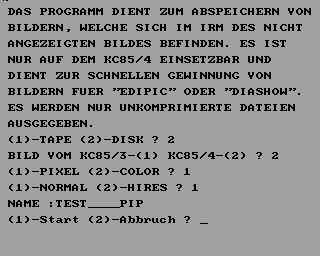CFOG's PIP, April 1986, Volume 4 No. 6, Whole No. 42, page 3
MicroPro, Kaypro, Osborne, and CP/M Computers -- Where do we go from Here
by Benjamin H. Cohen
The Good News:
An ad in the December 1985 Profiles magazine [published by Kaypro Corporation] offered 8-bit Kaypro owners an update to WordStar 3.3 for $79. I wrote to MicroPro on our user group letterhead asking whether the upgrade for Osborne users was still available, if not in Osborne format then could the Kaypro format version be used, and whether the version 3.31 that I have seen advertised is available for CP/M users on 5.25 inch media.
Well, at least I did get a response. Imagine my surprise to find in the CFOG post office box an envelope from MicroPro with a hand written return address, hand addressed! I guess they don't have computers!
The Bad News:
Enclosed in the envelope was a form letter from MircoPro addressed "Dear Kaypro owner". "Unfortunately," the letter says, "we have found problems in adapting our software to your Kaypro machine." The letter concluded that my order was being returned.
I wish I had better news, but it seems that MicroPro ain't interested. That seems to be the general status of the "real world" as far CP/M is concerned.
The Bad News:
Kaypro has eliminated all of its CP/M models except the 2X. The article reporting this InfoWorld reports the general view that the CP/M market is dead. Osborne is now being liquidated. Morrow has essentially dropped out of the CP/M computer business. Most CP/M users familiar with Kaypro, Morrow, or Osborne systems will consider the Commodore 128 disk drives too slow for business applications.
What's left? Find a used computer or go to a systems developer like Don Castella of Disks Plus in Prarie View and get him to make you an SB180 or Ampro Little Board system.
The Good News:
We recently learned about a new 8-bit system called the ON! computer, a full ZCPR3 system with 2 MB of RAM disk, apparently operated on a rechargeable battery and fully protected from any loss of data by power fluctuations or failures! It comes with an 800K floppy, NewWord, etc. We hope to have more on this shortly.
Exciting developments are coming with the development of ZCPRB3 from Echelon, Inc. This new replacement for CP/M will allow machines like the Executive and the SB180, which have banked memory, that is, more than one bank of 64K main memory, to run different programs in each bank of memory, jumping from one bank to another while different functions run in each bank. When you hit the "!" to recalculate a big SuperCalc spreadsheet you can jump to another bank to do a big global replace in a WordStar file, then jump to a third bank where your telecommunications program will have just finished downloading a long file from the CFOG RCPM. The functionality of CP/M computers will increase to the point where it will exceed by far that of MSDOS computers. Why? Because the limitation of 64K RAM, which in ZCPRB3 will mean several 62K working areas for programs (TPA, or transient program area), will mean tight fast running code, while MS-DOS will expand to megabytes of memory leading programmers to write behemoth programs that are slow to execute.
More Good News!
Another article in InfoWorld reported that Riva Software [3255 Broderick St., #17, San Francisco, CA 94123, (415) 382-1080] organized by some former employees of MicroPro, is offering copies of discontinued MicroPro software for CP/M-80 at discounts of 30 to 70%. I'm not so sure how good this news is -- They want $299 for WordStar, $69 for Mailmerge, don't mention upgrades at all, and don't provide a list of computers for which the programs are available, but only a note that "generic CP/M" is not available. Other MicroPro products are also available. If it's WordStar you want, call the folks at NewStar Software [(415) 932-2526] and order NewWord -- at $125 it's a bargain and outshines the old WS, too.
A Final Word:
In a few short years the users of MSDOS will be in essentially the same position CP/M users are today -- bypassed by a world that has moved on to newer toys they will be foundering in a backwater where there is little new software development going on, little new hardware development, and the damn things will still do just what they used to do, and quite satisfactorily. They may be even worse off -- there are a bunch of dedicated folk out there determined to make the 8-bitters go [and while they are correctly convinced that the 8088 is an 8-bit chip, that's one they are not interested in!].

